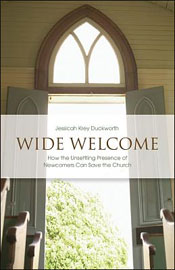Jessicah Duckworth’s book Wide Welcome speaks to the question of how congregations can best welcome newcomers, engage them in Christian practices, and nurture their faith. But it is not a book of easy answers or quick fixes. In approaching this question, she offers a theologically compelling critique of what passes for evangelism in most mainline congregations and calls the church back to its true identity — not as an institution — but as a people gathered under the cross.
The church cannot be blessed by the renewing, life-giving promise embodied in new people without genuinely opening itself to their unsettling and questioning presence.
Duckworth lays bare church outreach efforts that merely market the institution and new member activities that orient people to church structures and programs while never bothering to ask what newcomers want and need to know. The church cannot be blessed by the renewing, life-giving promise embodied in new people without genuinely opening itself to their unsettling and questioning presence.
Duckworth reminds us that discipleship is not an abstract principle but rather a way of living. “Discipleship is learned through participation in congregational practices such as Bible study, prayer, worship, care for one another, service toward neighbor, and many others,” she writes. “Newcomers gain knowledge and skill only as they participate in congregational practices over time, together with established members.”
Accordingly, she posits an approach to Christian formation in which sensitive, seasoned persons take newcomers under their wings. As they engage side-by-side in shared ministry, the “oldcomers” help the newcomers understand the faith significance of various practices. At the same time, these sages welcome the newcomer’s presence, perceptions, and questions that sow the seeds of challenge, change, and renewal within the congregation. She envisions a depth of spiritual apprenticeship rarely found in common programs matching new members with a buddy or sponsor — and one that seemingly is wholly dependent on the pairing of highly motivated seekers  and guides of uncommon spiritual maturity and grace. Yet one of Wide Welcome’s unique gifts is its uncanny ability to cast a vision for disciple-making that is both highly idealized and, at the same time, true to the reality of how ministry and relationships flourish within the context of community. Duckworth’s cruciform catechesis is less a program or approach than it is a cultural and spiritual mindset.
and guides of uncommon spiritual maturity and grace. Yet one of Wide Welcome’s unique gifts is its uncanny ability to cast a vision for disciple-making that is both highly idealized and, at the same time, true to the reality of how ministry and relationships flourish within the context of community. Duckworth’s cruciform catechesis is less a program or approach than it is a cultural and spiritual mindset.
The book’s primary focus on “inviting in” rather than “sending out” might seem too narrow in a day when the frontline of evangelism is often beyond the walls of a congregation rather than within them. Yet in her conclusion, Duckworth underscores the church’s primary mission of engaging the world. She reminds us that the church can only move toward the world when it is capable of opening itself to the presence of others.
Jessicah Duckworth’s Wide Welcome: How the Unsettling Presence of Newcomers Can Save the Church is available through Amazon or Cokesbury.
Related Resources:
- Top 10 Learnings about Welcoming Newcomers by Keith Anderson







